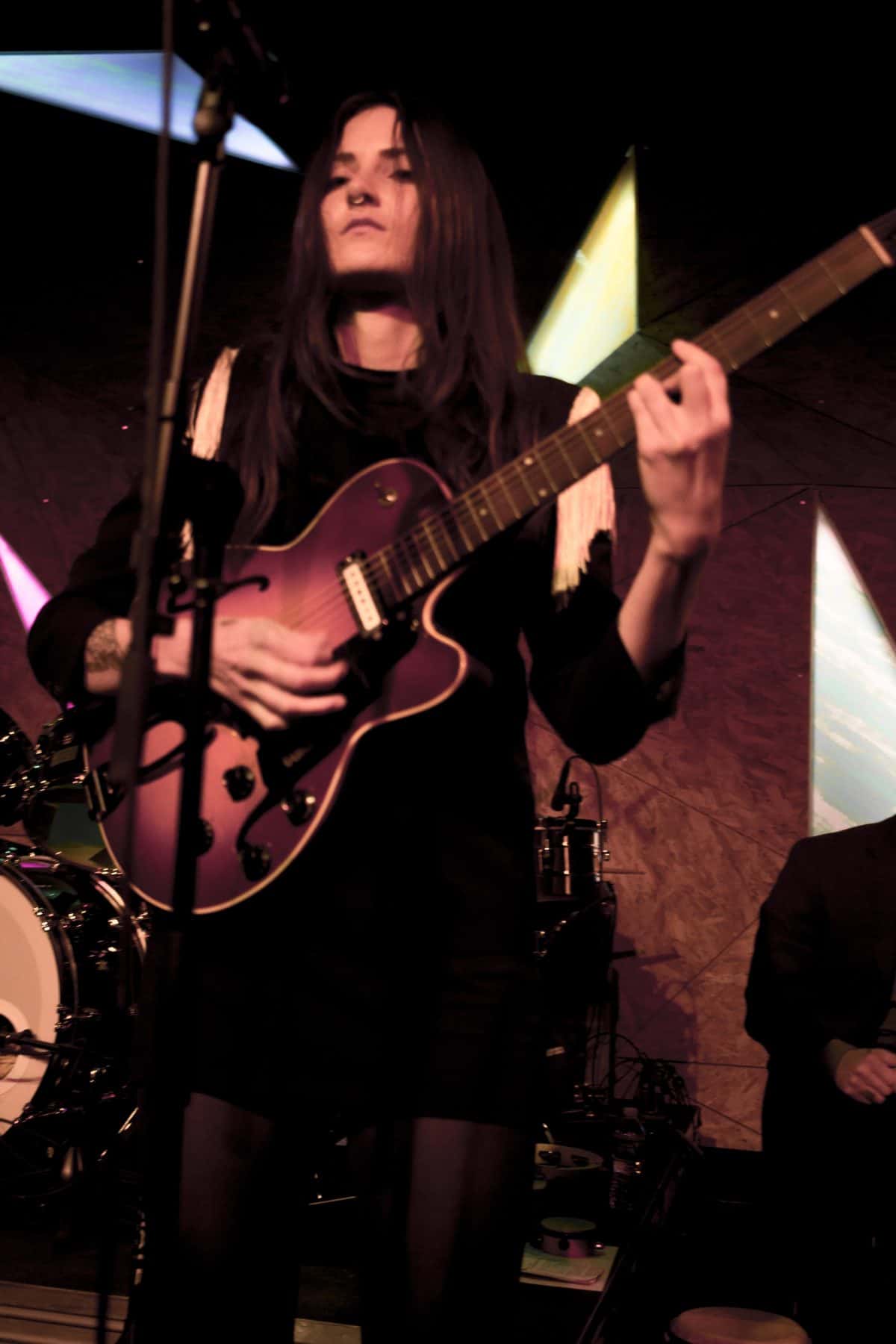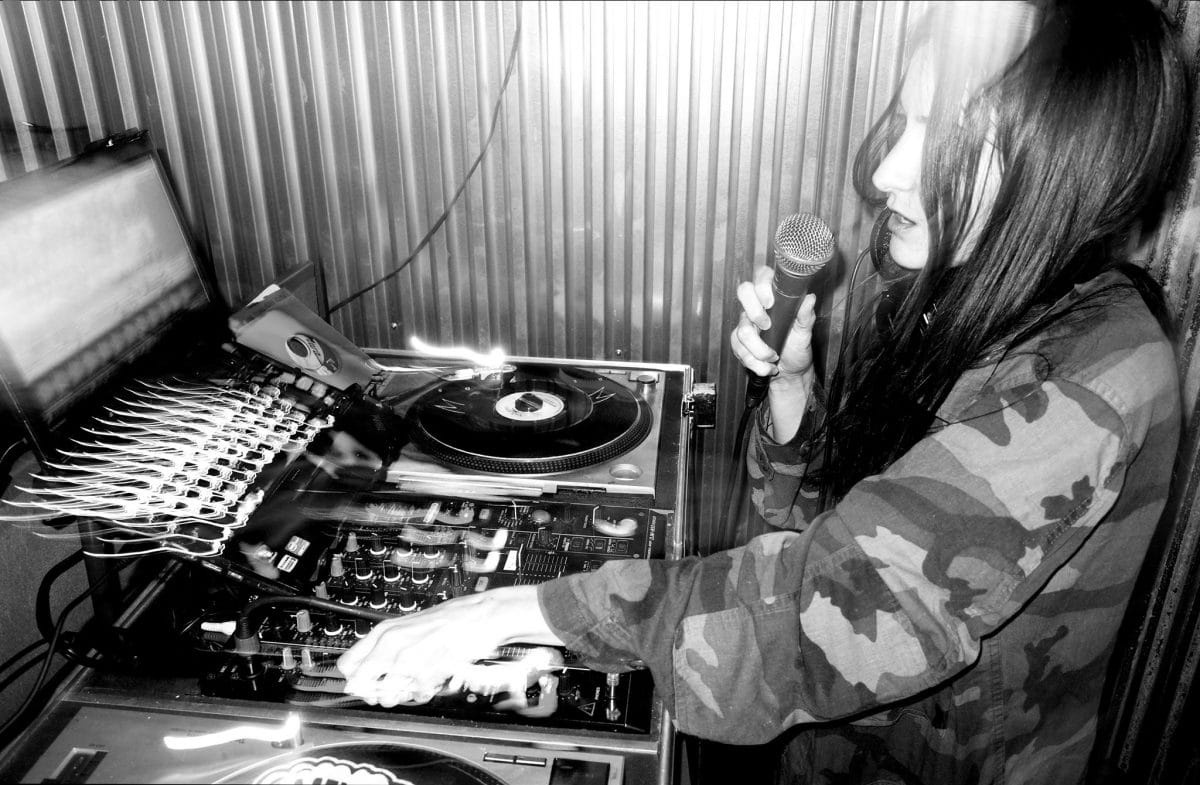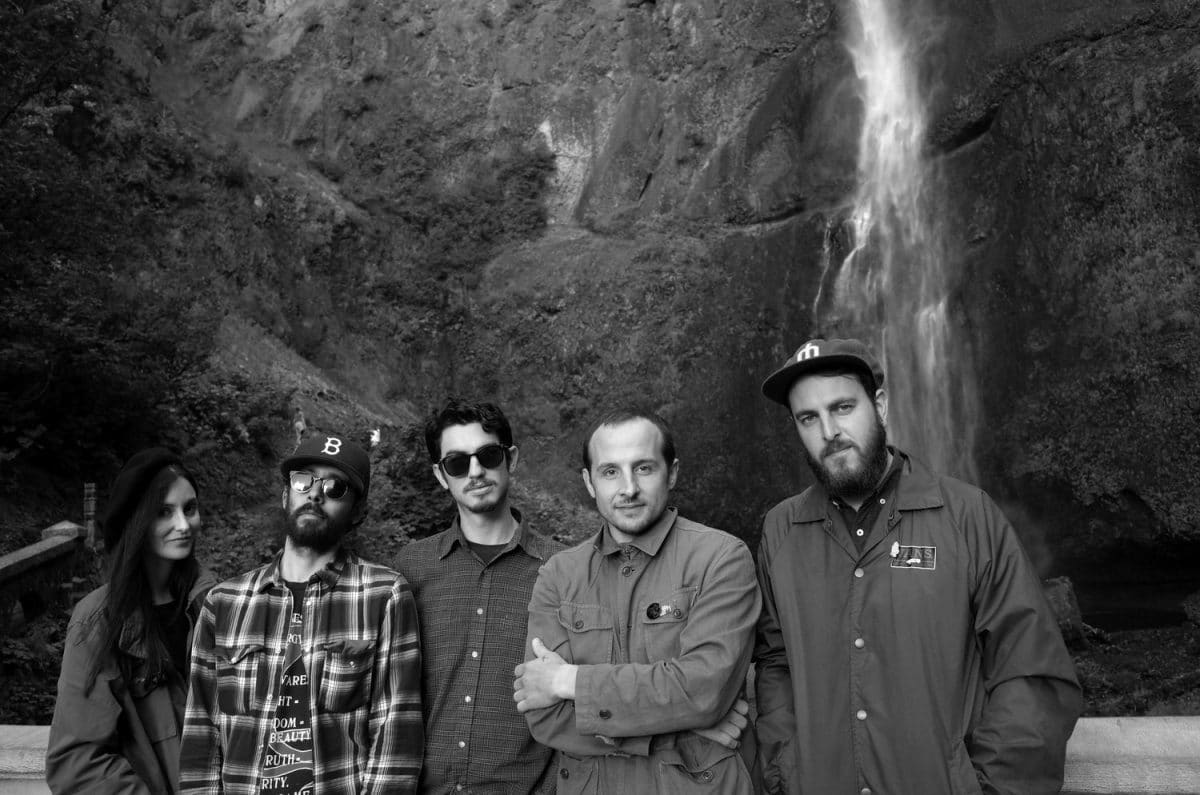“The goal is to write and record the baddest riddims possible and watch Babylon tumble from the weight of pure bass.”
-Maddie Ruthless, NYC, 2018
Over the years, I have had the privilege of interviewing quite a few musicians from within the reggae community and beyond. These experiences have exposed me to some inspiring and impactful thoughts and ideas, but the words expressed above by singer/deejay Maddie Ruthless flat-out gave me chills. Lawd a massi!
To date, our Rootfire Women in Reggae series has covered legendary Jamaican songstress, Sister Carol, modern roots champion Jah9, and most recently, British singer Hollie Cook. Today, we continue with our first article about an American reggae artist, Maddie Ruthless.
A fixture in the New York City reggae scene, Ruthless has made a name for herself as a respected “selectah” as well as the frontwoman of the Brooklyn-based band The Far East, who specialize in rocksteady, roots and classic dancehall sounds. Those familiar with the band, who have twice toured in support of British two-tone heroes The Specials, eagerly await the band’s upcoming release.
Ruthless has a deep knowledge of vintage reggae and is driven by an intense fervor for this timeless music. Like many people who share these traits, her passion was fueled by a learned mentor, and her acumen both as a deejay and musician honed over years of dedication to the crafts. She was flattered to be featured in our Women In Reggae series, and Rootfire is excited to cast some light on the reggae revival coming out of the five boroughs. (Be on the lookout for more content to follow on that topic.)
Rootfire: Is Ruthless your given surname, or a professional performing name? If the latter, how did you choose that moniker?
Maddie Ruthless: The name was given to me as a youth involved in Punk rock music. I am a big believer that names are given, not chosen. I think it suits me!
RF: How were you first introduced to reggae music and what drew you to it? Was it love at first listen, or did it slowly grow on you the more you listened and learned about the music and culture behind it?
MR: I was introduced to reggae through my older brother who was a big fan of The Specials. As a teenager, we lived in London in the summer where my mother worked. I spent a lot of time there seeing live reggae and exploring record shops. I remember there was a Sizzla & Capleton co-headlining tour coming through London at that time with a lot of promotion with hand painted signs all over Brixton. That left a big impression on me. In 2007, a reggae specific record shop opened in New Orleans called Domino Sound. I got a job at the shop and the owner of the shop, Prince Pauper, really cultivated my interest in reggae and became a teacher to me. He helped educate me in riddims, Studio One, and dancehall. My love of reggae has always been tied to my record collection.
RF: You grew up in New Orleans, a haven for jazz and blues. How did growing up there influence you as a musician and as a person as a whole? Did New Orleans play a role in your attraction to reggae?
MR: My family is quite large and has a deep appreciation of music. There are a lot of musicians in my family. In New Orleans, people respect musicians at the same level that they respect doctors and lawyers. I would say that New Orleans is most focused on its own music, and that music is undeniably a cousin to reggae music. When I started into collecting ska and rocksteady, it felt very familiar. Many of those songs are borrowed from New Orleans songwriters. I worked in some recording studios as a youth and got to work for Allen Toussaint once. His name is on a lot of Jamaican records as the songwriter.
RF: Back in NOLA, you had curated a weekly reggae night. Can you tell us a little bit about that? Does NOLA have a strong reggae community?
MR: New Orleans is a smaller city than I think most people realize. About 400,000 people. For that size of a city, the reggae community is strong. People come to New Orleans to see music and they can easily find reggae there. DJ T Roy has hosted two weekly, popular dancehall and roots nights in New Orleans for over 10 years. Prince Pauper runs a reggae-centric vinyl record shop called Domino Sound. There are several Jamaican restaurants and a small, but strong Jamaican community. There are some Caribbean social clubs as well.
The most notable thing about music in New Orleans is that people cut loose there in a way that I have seen nowhere else. People that come out for music dance until morning. You can have a party where someone spins bounce, someone else spins cumbia, and people don’t care. They will party all night long because of the magic of that city!
RF: How would you describe the difference of the musical communities of New Orleans vs. NYC? What do you miss the most about New Orleans? What do you love the most about living in NYC?
MR: I miss my family, my culture, and my community in New Orleans. I miss the traditions I grew up with like Mardi Gras and Twelfth Night. I miss the food. I miss the wild, free natural surroundings of south Louisiana.
The main difference between the musical communities is that New York City has over 300,000 Jamaican people. Reggae and Dancehall is woven into NYC. We are home to the world’s best selectors and sound systems. It’s a privilege to stand side by side with veteran artists and sound men in the dance. Being able to go out and see people like Downbeat the Ruler or Jah Wise play records is indescribable. I draw continuous inspiration from the knowledge of elders, rich in the history of the culture. I’m energized by the youth who respect and celebrate the culture with a new energy. Deadly Dragon Records was crucial to my growth as a music collector and performer. Reggae music is life in New York.
RF: What came first, spinning reggae or playing reggae?
MR: Playing!
RF: Tell us about your deejaying in Brooklyn. Where/when can you be heard and what are five artists that partygoers will be sure to hear? Have you ever deejayed at any special events or festivals in addition to your ongoing sessions?
MR: Deejaying has taken a backseat to musical performance for me in the past couple of years. You can still find me playing records in my neighborhood, Bushwick, occasionally. I deejay with my best friend Chuck as a sound called Jr Volcano Posse. We host a lovers rock party at Our Wicked Lady sometimes.
I have also been blessed to select at the Coney Island Reggae on the Boardwalk festival here in Brooklyn. Abroad, I have had the chance to select at a few festivals in the Netherlands and Belgium that I am grateful for.
If you see me select, you will hear tunes on the Volcano and Channel One labels absolutely. I almost always play something by Shinehead or Pinchers. Lately I am really loving Cocoa Tea and Half Pint as well. I made a mixtape this year you can check here:
RF: Do you have a preference between deejaying and performing? If so, why?
MR: I think the two are rather intertwined. Jamaican music is sound system music. I think you have to be well versed in each style to be a dancehall or reggae artist. “One turntable and a mic” is a traditional style that I love. It’s all about singing over records. I prefer to have my band and my guitar but I will ride out for both mediums.
RF: I presume your band, The Far East, is named for the album (or single) by Jamaican singer Barry Brown, who rose to prominence in the early dancehall era? If so, why this album/song of the many great ones from that era? Does the name tie into the fact that you are based in NYC?
MR: You guessed right! The name has many meanings for me. Barry Brown is one of my all-time favorite singers. The message of the song is powerful to me. A friend of mine, who was close to the artist, Glen Adams, told me that Glen used to call weird, or “out there” songs “Far East” kind of like “Far Out”. Going to the east has been a reference for Rastas to repatriation. I have a lot of respect for the revolutionary ideas of Rastafari.
RF: The Far East has been together for about five years and has released a number of singles, but no LPs. The band has toured with The Specials twice and also supported other acts including The Wailers, The Slackers and The Skints. When performing, does the band typically include covers in their set lists? If so, do you find any artists more challenging to cover than others?
MR: We play originals but have covered some of our favorite tunes. We keep a repertoire of classic, fundamental riddims. We play a lot from Studio One. We have also covered Deep Shadows by Little Ann and I am in Love by Jennifer Lara. We also cover Call Me by Linval Thompson.
RF: What has reggae music and/or music in general taught you about life? How has it shaped you as a person?
MR: Music is life for me! In all aspects.
RF: How has being a woman impacted your career as a musician and DJ?
MR: In a negative sense, there are many obstacles for a woman in the industry. There is a structure in place to hold power over women and keep women from their own potential. It feels like there is a snake in the grass. In many ways, I am privileged as a white woman. Women of color are the most oppressed people in this system of wealth and greed.
In a positive sense, women have a unique connection to music. Because we are excluded, in some ways our approach can be unique to men who have grown up with a more included place in the industry. I see women coming up with creative ways to subvert power and make music that sounds different. Women make places for other women. I am thankful to the women in Reggae that came before me. I am thankful to the women in punk rock that came before me. Ari Up is one of my icons.
I have a sister circle that I draw power from with women like Grace of Spades, Sweet V and DJ MisHap.
RF: Do you find the reggae scene an open and inviting community? Is the music industry in general shifting to a more gender-neutral state?
MR: I think the music industry is a faction of all industry. Babylon is not inclusive. In this time, I don’t have a lot of positive things to say about the way women are treated in business. Powerful veteran female artists, like Sister Carol, who hold a strong energy, inspire me. I feel frustrated by my label as a female artist rather than just an artist. I am often booked with other female DJs and female fronted bands. I love to work with women, but I wonder why women have to play only on female specific nights? It feels like our sound is a novelty to some.
RF: Who are some of your favorite musical artists and/or greatest inspirations, including reggae artists and beyond?
MR: Little Dan, Ari Up, Michael Prophet, Screechy Dan, Sister Nancy, Sugar Minott, Jennifer Lara, Judy Mowatt, Roxanne Shante. Recently someone asked me this question and I gave them a similar list and they let me know that I didn’t have to just answer with female artists. The truth is that I relate the most to other female artists. They are not secondary to me. I see my reflection in other women.
RF: The Brooklyn/NYC sound system scene and the affiliated bands, including your own, are deeply rooted in vintage Jamaican music, especially rocksteady, as one would expect. In addition to the other NYC area bands like The Slackers, The Frightnrs and Top Shotta Band, are you familiar or friendly with some of the other artists creating modern rocksteady music, such as The Aggrolites, Jr. Thomas & the Volcanoes, The Prizefighters, The Flying Vipers, The Steady 45s, The Delirians and The Loving Paupers, to name a few?
MR: Absolutely! We have played with almost every band you have mentioned. We have played maybe one million shows with The Frightnrs. Jr Thomas & The Volcanoes is one that we haven’t played with yet, but I hope they are reading this and will want to soon!
RF: Do you also keep up with modern reggae music, Jamaican, American or otherwise? Who are some of your favorite artists? Are there any artists or producers from this community that you would like to record or tour with?
MR: I do keep up with a lot of modern music as well. I am a huge fan of Jah9 and Hempress Sativa. I also love Samory I and I’m excited to see what he does next. I listen to a lot of hip hop as well. I love NxWorries right now and SZA. Santigold is a forever inspiration.
RF: Within the progressive roots community, there has been some discussion about cultural appropriation. What are your thoughts on that?
MR: I read recently that a definition of appropriation is taking from without giving credit or taking from in a way that is mocking of that culture. As a New Orleanian, I have some understanding of what it’s like for your culture to be spread all over the world. I think it’s a beautiful thing to culturally exchange, but we can never disconnect black power or Jamaica from the story of reggae.
RF: What do you do when you’re not deejaying or creating and performing music?
MR: I ride my bicycle a lot and I also grow tomatoes. I like to drink beer in Queens with my friends the Frightnrs.
Women In Reggae – Hollie Cook
RF: The Far East has a new album close to releasing. Could you tell us a little bit about the people involved and what fans can expect?
MR: We are in the midst of releasing a showcase of some original tunes with some versions by veteran NYC artists. It feels like an homage to NYC as well as an introduction to our style. The release was produced by Brett Tubin of Channel Tubes. He has been crucial in shaping our sound with his production techniques and love for the music. We owe him a lot in helping us to find our own sound. Having versions on the album from veteran artists also feels like a true blessing. It should give listeners a sense of where we came from.
We had a wicked time making the music as well as making the videos and art that will surround it.
RF: Do you have ultimate goals for either or both facets of your musical career, or are you just enjoying the ride, wherever it takes you?
MR: The goal is to write and record the baddest riddims possible and watch Babylon tumble from the weight of pure bass. My goal is to sing for the people, all over the world. We want to help people feel something deeper with our music. We want to highlight some of the beauty people who might not be as familiar with the style haven’t seen yet.
Keep an eye out for Maddie Ruthless and The East Band’s upcoming EP Channel Tube Presents The Far East.
[gravityform id=”76″ title=”false” description=”true”]



